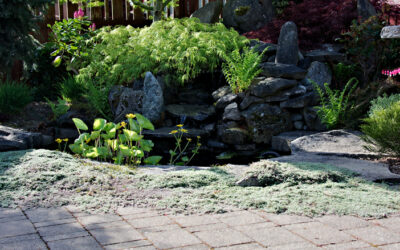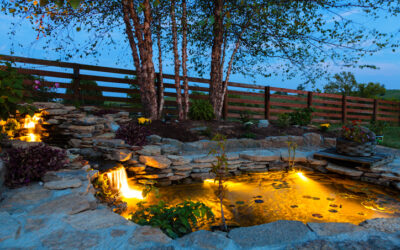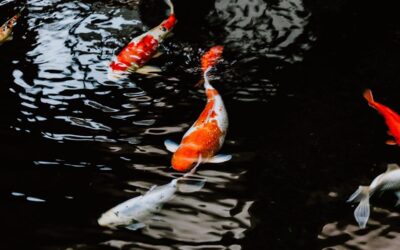Raccoons, with their curious nature and cute, masked faces, may seem like endearing visitors to your backyard. However, these nocturnal creatures can pose a significant threat to the safety and well-being of your pond’s inhabitants, such as fish and other aquatic life.
Raccoons are known to prey on fish and can wreak havoc on the delicate balance of your pond’s ecosystem. I unfortunately have suffered the experience of waking up with scales all over my yard from a raccoon successfully finding a meal in my pond, and want to help you avoid the same fate.
Although they might look adorable, you should take measures to keep raccoons away from your pond if you know they live in your area. In this article, we will explore various ideas and strategies that can help you protect your pond and its residents from these opportunistic creatures.
1. Install a fence
A well-constructed fence can be an effective barrier to prevent raccoons from entering your pond area. The fence should be high enough to prevent raccoons from climbing over, and the gaps between the fence slats should be small enough to prevent them from squeezing through.
If it is safe to do so for your pond, you can add an outward-facing overhang or electric wire at the top of the fence to further deter raccoons from attempting to climb over. By creating a secure perimeter around the pond, you can significantly reduce the chances of raccoons accessing and causing damage to your pond ecosystem.
2. Use a pond net or cover
Pond netting can be an effective solution to keep raccoons from disturbing your pond, as it physically prevents them from accessing the water and preying on fish. However, it’s essential to choose a strong and durable netting material to avoid accidentally causing harm to raccoons.
If the netting is weak or has large gaps, raccoons may get entangled and risk drowning in their attempts to escape. Carefully selecting the appropriate netting material and ensuring proper installation can protect both your pond and the raccoons.
3. Motion-activated sprinklers
Motion-activated sprinklers can be an effective tool for keeping raccoons and other wildlife away from your pond.
When the sprinkler detects movement, it releases a sudden burst of water that startles the animal and deters it from approaching the pond further. This method can also be helpful in discouraging birds from visiting your pond, as they, too, will be startled by the unexpected spray of water. By using motion-activated sprinklers, you can create a safe and secure pond environment for your fish while protecting local wildlife.
4. Motion-activated lights
Incorporating lighting around your pond can help deter raccoons from entering the area. Installing in-pond lights can make it more difficult for raccoons to see and catch fish, while perimeter lighting can create an unwelcoming environment for these nocturnal animals. Raccoons are generally wary of well-lit areas, as they prefer to forage in the dark to avoid detection.
5. Remove food sources
Eliminating potential food sources around your pond can help deter raccoons and other predators from being attracted to your property. By taking the following steps, you can reduce the likelihood of raccoons coming near your pond:
- Securely close trash cans: Make sure trash can lids are tightly sealed to prevent raccoons from accessing the contents.
- Store pet food indoors: Avoid leaving pet food outdoors, as it can attract raccoons and other wildlife.
- Clean up fallen fruit: Regularly pick up any fallen fruit from trees on your property to prevent raccoons from foraging.
- Use bird feeders with care: If you have bird feeders, consider using designs that are less accessible to raccoons or remove them during nighttime hours.
By minimizing the availability of food sources, you can discourage raccoons from frequenting your property and potentially threatening your pond.
6. Eliminate hiding spots
Keeping the area around your pond free of debris and overgrown vegetation can help deter raccoons by eliminating potential hiding spots. This approach can also assist in preventing other unwanted pests, such as mice and rats. To maintain a clear pond perimeter, consider the following:
- Trim overgrown plants and bushes
- Remove piles of leaves and branches
- Keep grass mowed and neatly maintained
- Clean up any clutter or discarded items
A well-maintained pond area not only helps prevent raccoons from seeking refuge but also contributes to the overall aesthetic appeal of your backyard oasis.
7. Use repellents
Applying raccoon repellents around your pond’s perimeter can help deter raccoons from approaching. Commercially available repellents, such as those containing capsaicin, can be effective in keeping raccoons at bay. However, for households with children and pets, natural repellents may be a safer alternative. Some examples of natural repellents include:
- Ammonia-soaked rags
- Sprinkling cayenne pepper around the pond
- Planting garlic or onions nearby
Remember to reapply repellents regularly, especially after heavy rain, to maintain their effectiveness.
8. Install a Radio
Playing a radio near your pond, particularly at night, can create the illusion of human presence and deter raccoons from approaching. Raccoons are generally wary of human activity and will avoid areas where they perceive humans to be present.
By tuning the radio to a talk station, you can simulate the sound of people conversing, which can help keep raccoons at a distance from your pond.
9. Electric fencing
Electric fencing can be an effective way to deter raccoons from entering your pond area. When a raccoon comes into contact with the fence, it receives a mild electric shock, which is generally enough to discourage it from attempting to access the pond again. The key to success with electric fencing is ensuring proper installation and maintenance, including grounding and regular checks for damage.
It’s essential to install the electric fence in compliance with local regulations and ensure that it is safe for other animals and humans. Consider using a low-voltage electric fence designed specifically for deterring small animals to minimize potential harm. By implementing an electric fence around your pond, you can create a safe and secure environment for your fish while effectively keeping raccoons at bay.
10. Predator decoys
Predator decoys, such as realistic replicas of owls or coyotes, can be an effective way to scare raccoons away from your pond. Raccoons instinctively avoid areas where they believe predators may be present, and the decoys create the illusion of a potential threat. By strategically placing decoys around your pond area, you can deter raccoons from approaching your pond and its inhabitants.
For predator decoys to be most effective, it’s crucial to move them periodically to maintain the illusion of a living, moving predator. Raccoons may become accustomed to a decoy that remains stationary and eventually realize that it poses no threat. By regularly changing the decoys’ positions, you can keep raccoons on their toes and prevent them from becoming too comfortable around your pond.
Wrapping Up
The tactics outlined in this response, combined with the measures mentioned in the previous two responses, provide a comprehensive approach to deterring raccoons from entering your pond.
By implementing a combination of these strategies, you can create a safe and secure environment for your fish and other pond inhabitants while keeping raccoons at a safe distance.
The key is to be proactive and regularly assess the effectiveness of your chosen deterrents to ensure that your pond remains a raccoon-free oasis.

About the Author
With decades of experience, James shares his extensive knowledge in aquatics through this website, covering a broad series of topics related to the pond and aquarium hobby. Aiming to guide both beginners and experienced hobbyists alike, his goal is to help educate aquatic enthusiasts for the long-term betterment of the hobby as well as the environment. Learn More >>
Finding the Perfect Pond Placement in Your Yard
Pond placement in small-scale landscape design is essential for creating a cohesive and aesthetically pleasing outdoor space. The right location can enhance your yard's visual appeal while ensuring that your pond receives the proper sunlight, has the ideal...
Pond Safety: Making Your Backyard Pond Safe for Kids and Pets
Common Considerations for Keeping Your Pond a Secure and Enjoyable Space Note: This list is not exhaustive but should give you some good ideas of how to make your pond a safer and more enjoyable experience! Are backyard ponds safe for kids? Backyard ponds can be a...
How to deter birds from eating your fish
Koi ponds have become increasingly popular in recent years, and for good reason. Not only are they beautiful and peaceful, but they also provide a chance to connect with nature and be a source of personal accomplishment. In this list, we will explore three top reasons...



